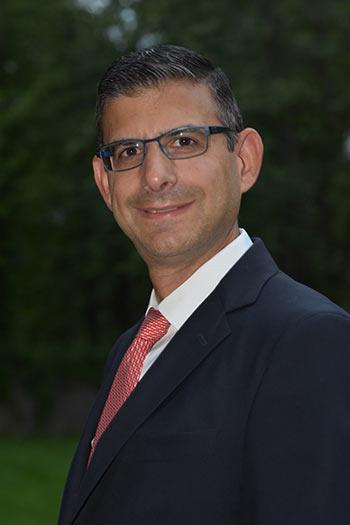
Alumni Profile: Marc Gironda '00
Marc Gironda '00 found his interest in becoming a psychologist through his love of music.

Why do we like certain music over others? Why are some melodies so emotionally powerful and moving, such as Beethoven's Ode to Joy, that they are performed and beloved by virtually all people across all generations?
A graduate of the PsyD program in school-clinical psychology, Gironda, plays both the piano and trumpet, and is most fascinated by the universality of music, its timelessness, and presence in every culture.
He is also interested in musical perception.
“I enjoyed investigating how musicians versus non-musicians process music in the brain, as well as the similarities between music and language,” Gironda said. “Most aspects of how we perceive and understand music, both emotionally and cognitively, were interesting to me.”
As an undergraduate, he earned bachelor’s degrees in both music and psychology at Colgate University, but it was his coursework in applied psychology that led him to Pace’s APA-accredited PsyD program on the New York City campus.
Today, Gironda credits Pace with not only providing an academic curriculum that prepared him for his current work and practice, but also access to professors such as Richard Velayo, with whom he presented research at conferences sponsored by the American Psychological Society and Eastern Psychological Association.
His rigorous field placements were also a big part of the making of this dedicated professional.
Gironda worked as a school psychologist at the Pequannock Township School district in New Jersey, as well as with children and adults, in both inpatient and outpatient settings, at Hackensack University Medical Center and Morristown Memorial Hospital (now Morristown Medical Center).Although it was a challenge to balance the demands of graduate school with the expectations of fieldwork, it left him feeling confident about his abilities as a practicing psychologist.
“I felt there was an excellent balance between academic and real-world preparation through my Pace education,” Gironda said.
He currently works at Bartky HealthCare Center in Livingston, New Jersey, focusing on children, adolescents, young adults, and their families. Recognized as a “Top Kids’ Doc” by NJ Family magazine, he sees patients with a range of issues, from anxiety and depression to adjustment after divorce and changing family situations, and has a special interest in working with individuals with autism, intellectual disabilities, and other neurodevelopmental disorders.
“The work can be hard, but it’s ultimately very meaningful when I can make a difference in an individual’s life,” Gironda said.
Q&A With Blake Rozelle '20
I chose Digital Cinema and Filmmaking as a major because I have always been interested in the film industry, and I was also very impressed by the program at the Dyson College of Arts and Sciences on the Pleasantville campus.
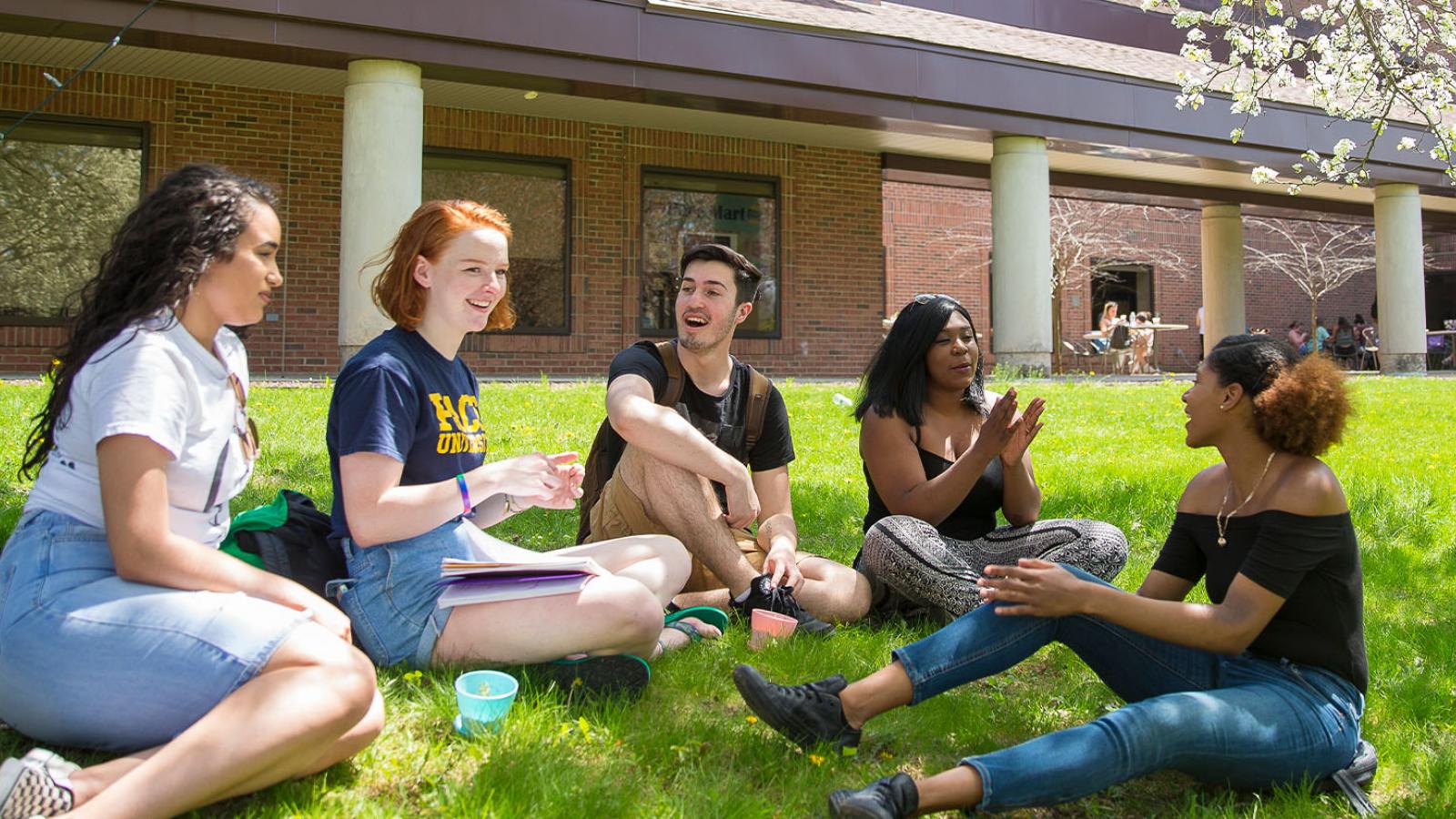
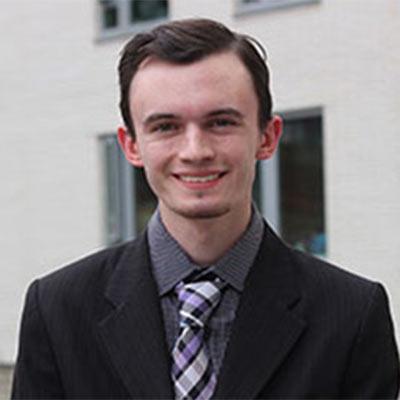
I chose Digital Cinema and Filmmaking as a major because I have always been interested in the film industry, and I was also very impressed by the program at the Dyson College of Arts and Sciences on the Pleasantville campus. The courses include many hands on assignments, the equipment available to students is quite impressive, and an internship is required in order to graduate. This spring 2018 semester, I enrolled in the travel documentary course to Puerto Rico, the focus of which has been the aftermath of Hurricane Maria. The process of creating a documentary in such a short amount of time has been complicated and a lot of work. However, the memories I have made are ones I will remember for a very long time. I am also a Dyson Scholar in Residence, and it has been a great experience to live within a diverse community of students in the residence hall. After graduation, I hope to do camera work or editing for a comedy or reality TV show. It would make going to work something I love to do.
Q&A With Katherine Ketterer '20
I chose Pace because when I visited, I immediately fell in love with the New York City campus, which is so close to many different opportunities.


I chose Pace because when I visited, I immediately fell in love with the New York City campus, which is so close to many different opportunities. I recently completed an internship at the United Nations, working with the Control Arms Coalition, an international alliance of non-governmental organizations (NGOs) which aims to end the illicit trade of small arms and light weapons. I also participated in the 2018 National Model United Nations (NMUN) conference as a head delegate, which involved supporting my fellow classmates with their position papers and the rules of the conference. It was so inspiring to see us develop into such a strong, award-winning team, which I credit to my Dyson education and the guidance of Professor Bolton and other head delegates. After graduation, I would love to work for another NGO focused on disarmament before attending graduate school, and then, either return to the UN or perhaps pursue a career at the White House!
Q&A With Kizzmett Pringle '20
Honored recently by the Princess Grace Foundation, Kizzmett Pringle is preparing to live her destiny as an actor.

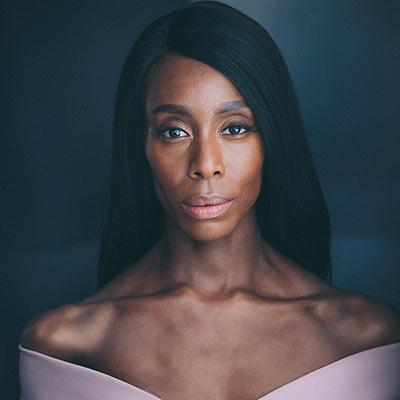
Honored recently by the Princess Grace Foundation, Kizzmett Pringle is preparing to live her destiny as an actor.
What was your experience like growing up in Detroit, Michigan?
My experience is nothing like what most people think of when they think of Detroit. I am proud to be from Detroit, and I rep my city hard. My Detroit is Motown, Motor City, AutoShow, Dream Cruise, Belle Isle, Mackinac Island, Thanksgiving Day Parade, Detroit Hustles Harder, Slow Roll, and the Movement Music Festival. My experience is also family. I grew up surrounded by love from my two amazing parents and my younger brother, also an MFA-trained actor. He recently graduated from the Shiley Graduate Theatre program, a joint venture of The Old Globe and the University of San Diego, MFA program, and we have shared passions, dreams, and goals. We have our own brother-sister language, and he just gets me.
Did you always want to act?
Detroit is the auto capital of the world, so a lot of activities and afterschool programs are geared (no pun intended) toward math and science. I enjoy math and science, so it was a no-brainer to go to school for engineering and, eventually, get a job [in the automotive industry]. That’s what you do when you grow up in Detroit.
I received my undergraduate degree in mechanical engineering, with a management minor, from Kettering University. Kettering is a private, cooperative education and experiential learning-based university, and I secured a co-op with General Motors (GM). During my first year at GM, I was 17 years old (I graduated high school early) and supervising a group of mostly men, who had been doing their jobs longer than I’d been alive. As you can imagine, for a young African-American woman, it was very interesting! LOL!
How did you get into acting?
Starting at a young age, my parents enrolled my brother and me in every camp, afterschool program, and class at the YMCA. You name it, we did it. One activity was a theater camp with the critically-acclaimed Mosaic Youth Theater of Detroit. I was 12 years old, it was my first experience acting, and I fell madly in love with every aspect: meeting new people, creating, storytelling, and, of course, the thrill of performing. Mosaic Youth Theater of Detroit changed my life.
Describe your experience at the actors studio drama school.
Long days, hard work, going above and beyond, and no sleep! This past year, I learned and discovered so much, but honestly, I was getting no rest. Along with being a full-time graduate student, I was an acting apprentice at the Obie Award-winning The Barrow Group, and I worked two jobs. You really have to love what you do to keep going.
One of my favorite assignments, which was during my first year of school, was animal work as part of the Stanislavski System. Transforming the human instrument into an animal serves as an introduction to character work, and for this assignment, the actor is asked to choose an animal to observe, research, and inhabit in front of peers. My animal of choice was a lioness, and let me be clear, this is not come in and "play" an animal, but rather, become one. To truly physically and mentally embody an animal—how they move, how they think, what they think, what they eat, how they eat—the research required is extensive. I took it upon myself to come in full lioness drag, and I stepped right into lioness. It was so much fun, and even now, the lioness is still with me.
What acting work are you most proud of?
As an African-American actor, the playwright August Wilson is king. Therefore, the opportunity to work on any play of his is a dream come true. During my second year of school, I worked on Gem of the Ocean. It is the first installment of The Pittsburgh Cycle, his decade-by-decade ten-play chronicle dramatizing the African-American experience in the twentieth century. I played the role of Black Mary, and it's the role that I have learned the most from as an artist. That is what I'm most proud of.
You received a grant this summer from the Princess Grace Foundation. Tell me about it.
Before I was even accepted into the Actors Studio Drama School’s MFA program, I created a graduate school vision board, which included a Princess Grace Foundation award. The foundation is dedicated to elevating extraordinary artists in theater, dance, and film. It donates millions of dollars to empower the diverse, inspiring, and extraordinary artists who have received the performing arts’ most distinctive honors —Academy Awards, Tony Awards, MacArthur Genius Awards, and Pulitzer Prizes—and who are shaping the American cultural landscape. I am now honored to a part of this amazing family, and this award means my hard work has been received and acknowledged.
What’s on your vision board for the future now?
I'm interested in sharing stories of powerful, groundbreaking women. Dream roles of mine include Eartha Kitt and Lottie 'The Body' Graves, a burlesque dancer in Detroit during the Black Bottom era. I consider myself a very physical actor, and I honestly discovered this through my movement classes at school. This past winter, I applied and was accepted into the Gibney Winter Dance Intensive, and this summer I fell in love with the aerial hoop. I eventually want to produce and perform my own 3D projection mapping, dance, and aerial hoop show.
I am also working on a social enterprise venture, possibly a nonprofit to address the lack of proof, representation, and awareness in the exploration, creation, and vision of one's life and life experiences, for minority women of color.
Is there a story behind your name that you’d like to share?
I get this question a lot. “Is that your real name?” “Do you know what it means?” “Interesting spelling.” My parents named me after my aunt, my father’s sister. I was told that my grandfather read the word in a book, and named her Kizzmett. I don't know where the unique spelling came from. Does my name have any special significance in terms of who I am as a performer and artist? No. But in terms of who I am as a person, yes. I have the word, Kismet, meaning fate or destiny, tattooed on my shoulder, because I feel like I'm living out my destiny.
Q&A With Zuher Ibrahim '20
Zuher Ibrahim ’20, History, Political Science, is a future policy maker whose Pace Path involves advocacy on mental health awareness, sexual assault prevention, and education access.

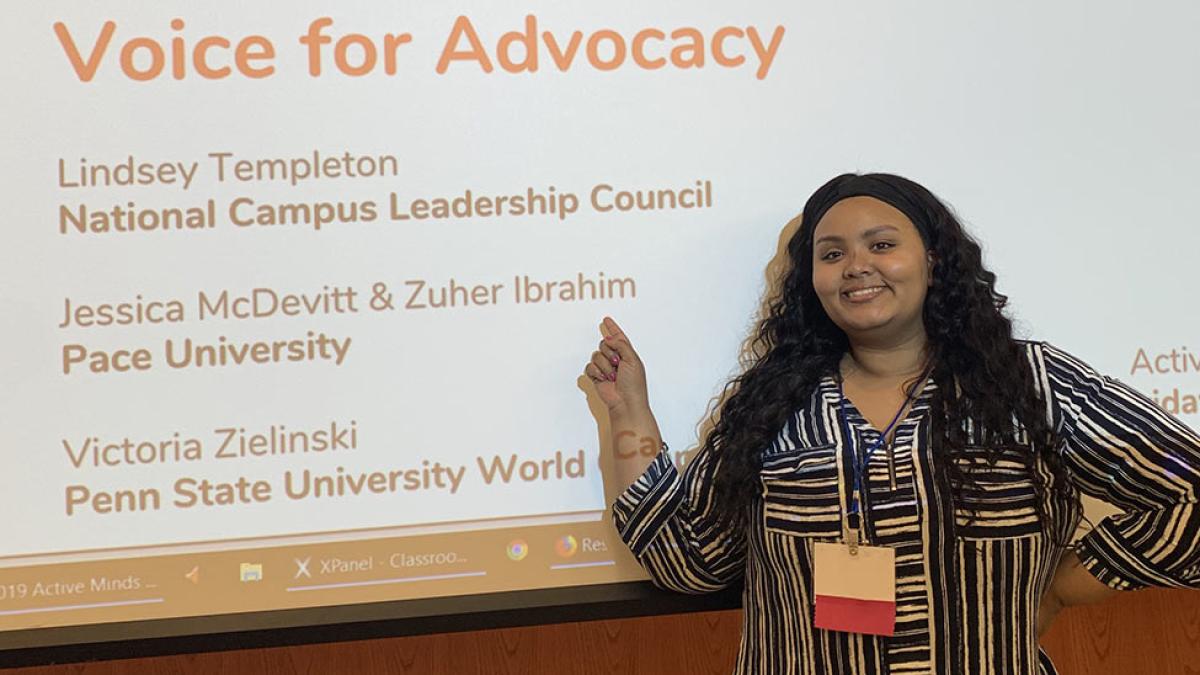
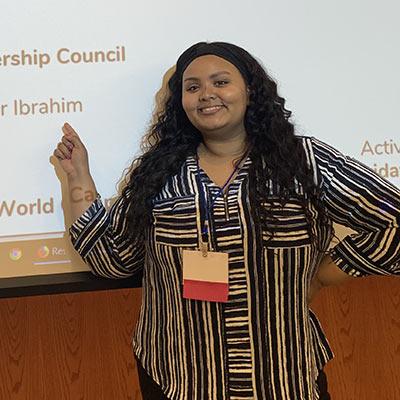
Zuher Ibrahim ’20, History, Political Science, is a future policy maker whose Pace Path involves advocacy on mental health awareness, sexual assault prevention, and education access.
Why did you choose to attend Pace?
I chose to attend Pace because of opportunities I felt would become available to me within Dyson and, more specifically, the New York Political Science Department. Once here, I was an intern during the fall 2018 semester with the Nobel Peace prize-winning International Coalition to Abolish Nuclear Weapons (ICAN), a global civil society working to promote the adherence and full implementation of the Treaty on the Prohibition of Nuclear Weapons (TPNW). This opportunity was available to me as a student in Professor Bolton’s class on Global Politics of Disarmament and Arms Control. I am also a first-generation student, and having the opportunity to attend a school of my choice has been a very humbling experience.
You are also a title ix ambassador in the dean for students office, as well as organized the out of the darkness suicide prevention walk in April 2019.
My work in the Dean for Students Office as a Title IX Ambassador has been exciting because it is unlike any other job experience I have had before. I recently participated in a webinar with Mount Sinai on Sexual Assault/Violence Intervention (SAVI) and the New York State Department of Health, providing feedback for an upcoming statewide toolkit on sexual assault policies across all SUNY campuses. My role when organizing the Out of the Darkness walk was as Vice President of Active Minds, a club on campus dedicated to breaking down the stigma of mental health on college campuses. Organizing it took months of prep, and we tabled for weeks before the event to bring awareness to suicide prevention, statistics, and what can be done with just a $1 donation! After months of planning, promotion, and finishing the walk-in April, we raised over $8,700 for the American Foundation for Suicide Prevention.
I chose to attend Pace because of opportunities i felt would become available to me within dyson and, more specifically, the new york political science department.
Outside of Pace, what internships have you had thus far as a student?
My first internship was as a College Transitioning Coach at the Student Leadership Network, where I assisted the Director of College Counseling in guiding over 100 students through the college application and financial aid process. I was later a Bridge to College Coach, in which, through a special certification, I ensured the quality of academic performance and attendance of more than 200 college students, post-deposit submission. This was an important task, as many high school students experience a “summer melt,” with over 40% not attending college due to missing documents, financial aid mistakes, etc. My most recent internship was at the New York City’s Mayor’s Office, where I managed email communications, letters, and 311 calls directly sent to the Mayor. In fall 2019, I will be a Campaign and Community Intern at DoSomething.
What would you like to do upon graduation/what are your career goals?
After graduation, I want to attend law school and have a career in politics, creating policies that will benefit low-income communities regarding education access across the United States, as well as overseas. I plan to open my own pro bono clinic for unfair cases, including cases for sexual assault, and build a foundation in my hometown in Ethiopia, with a mission of education access, especially for young girls.
What advice, if any, would you like to give to our current students?
My advice to current students would be to figure out what you enjoy, make it into a career, and advocate for yourself! You are in college in New York City, a place many would dream of, and should be exploring a career you enjoy with internship opportunities to rave about during your time as an undergrad. It is highly important to advocate for yourself - if you feel like something is wrong academically, physically, mentally, or emotionally, stand up for yourself and tell someone who can help you.
Q&A With Daisy Rivera Dominguez '20
I want to be an advocate for the environment, supporting policy efforts that encourage sustainability initiatives, climate policy, and wetlands conservation.

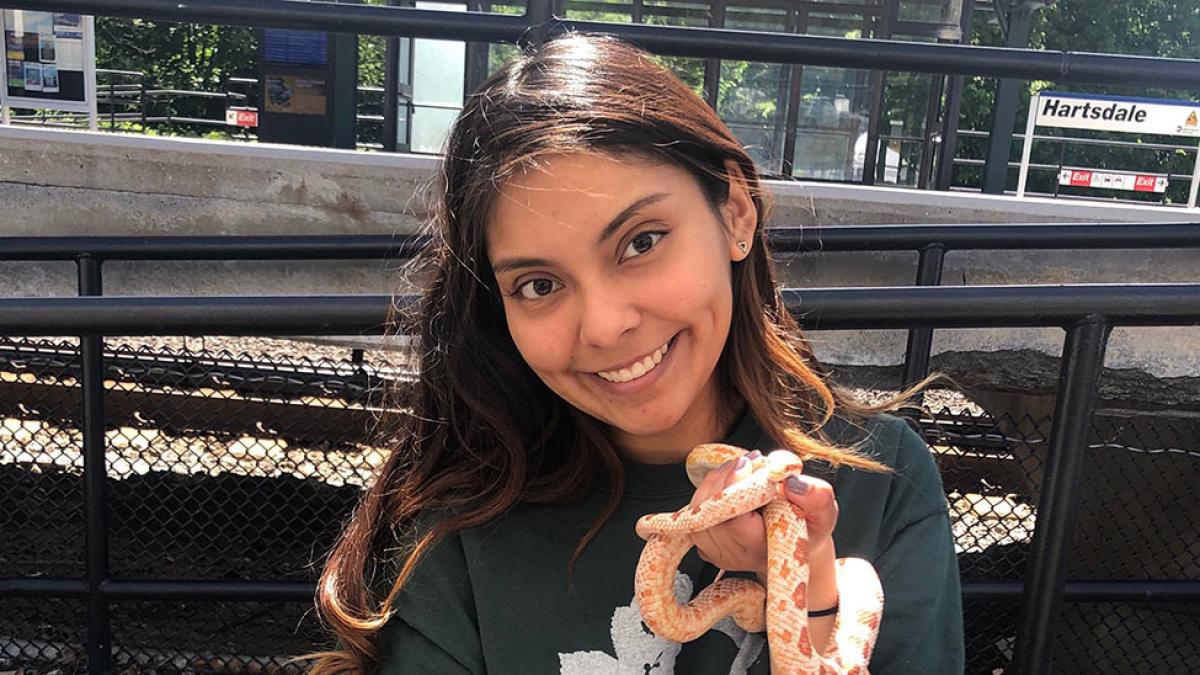
MAEP Student, inspired by two female faculty members, wants to advance natural climate change solutions.
What attracted you enroll in the MA in Environmental Policy (MAEP) program and what have your experiences been like thus far?
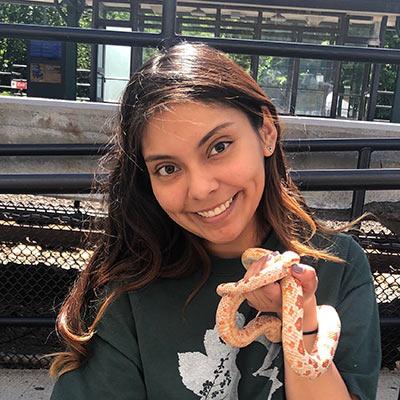
I was searching for how to continue my undergraduate education from Ramapo College of New Jersey, in a way that would help me achieve my career aspirations, and the fact that the MA in Environmental Policy program offers courses at Pace Law School was the main deciding factor. The program director, Michelle Land, has been one of my most influential faculty mentors. She goes above and beyond for her students and has guided me throughout my academic experience, which helped me land a position with GreenPace and secure my externship at the New York State Department of Environmental Conservation. Professor Smita Narula, from Pace Law School, is another kind soul devoted to teaching and her students. Pace has many remarkable faculty members, but I have so much admiration for these two women.
How is this course of study meaningful to you?
An environmentalist at heart, I want to be an advocate for the environment, supporting policy efforts that encourage sustainability initiatives, climate policy, and wetlands conservation. I am only one person, but I have met other students who are just as devoted and passionate about this work, and I believe that together, we will create change.
Have you had any internships while pursuing your studies? What are your career goals?
I have had three internships during my time at Pace. I worked as a sustainability intern at the Greenburgh Nature Center, as student assistant for the GreenPace Sustainability initiative, and currently, I am a policy intern at the New York State Department of Environmental Conservation, as part of my externship requirement. My career goal is to work in environmental consultancy or in environmental planning, with a mission to advance natural climate solutions to advance policy priorities and scale up climate ambition.
I want to be an advocate for the environment, supporting policy efforts that encourage sustainability initiatives, climate policy, and wetlands conservation.
What advice, if any, would you like to give to current students?
If you are currently pursuing an undergraduate major that you are not passionate about, it is okay to change your mind! To be asked to decide your future at the age of seventeen or eighteen is quite overwhelming. I changed mine from criminal justice to biology after I found myself more devoted to my science electives, and in the end, it all worked out. I was able to continue my education at Pace, studying topics and addressing environmental problems with individuals who share the same passion as me.
Pace University Becomes A Certified ‘Bee Campus USA’
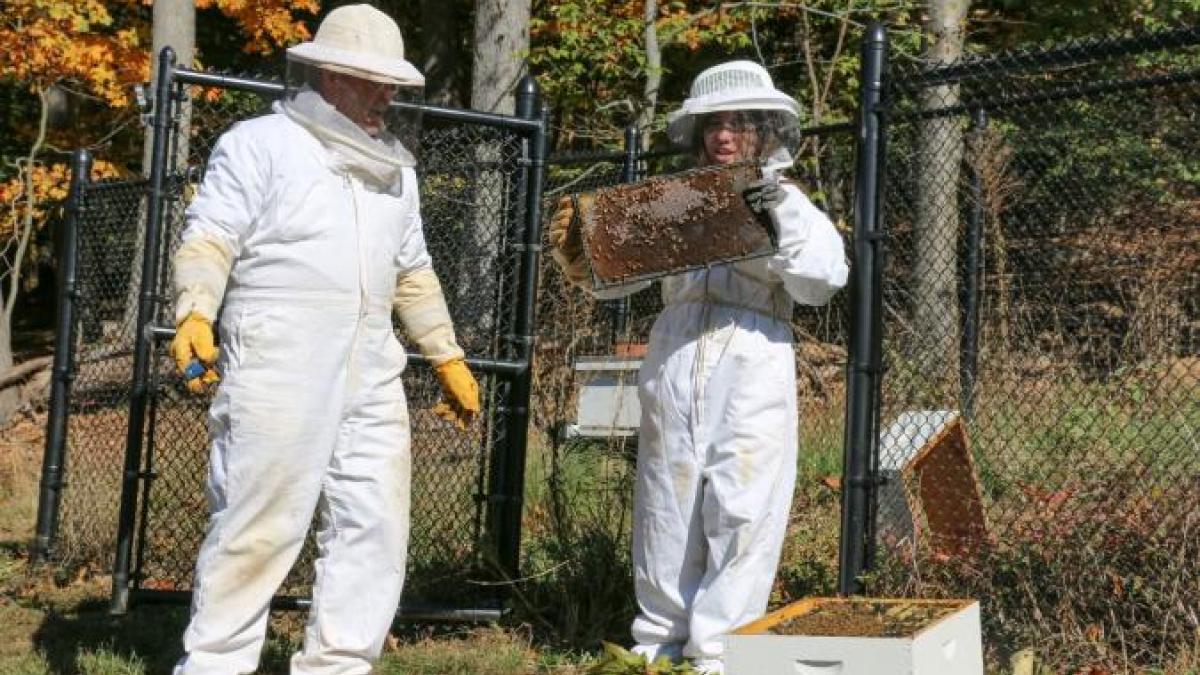
Designation Raises Awareness on the Important Role Pollinators Play in Food Supply
PLEASANTVILLE, N.Y., August 13, 2020 – Pace University’s Pleasantville campus has become certified as an affiliate of the Bee Campus USA program. The program is an initiative of the Xerces Society of Invertebrate Conservation based in Portland, Oregon, which raises awareness of the role pollinators play in our communities and encourages participants to enhance their habitats and educate students, staff, and faculty. More than 150 food crops in the United States depend on pollinators, including blueberries, apples, squash, strawberries and almonds.
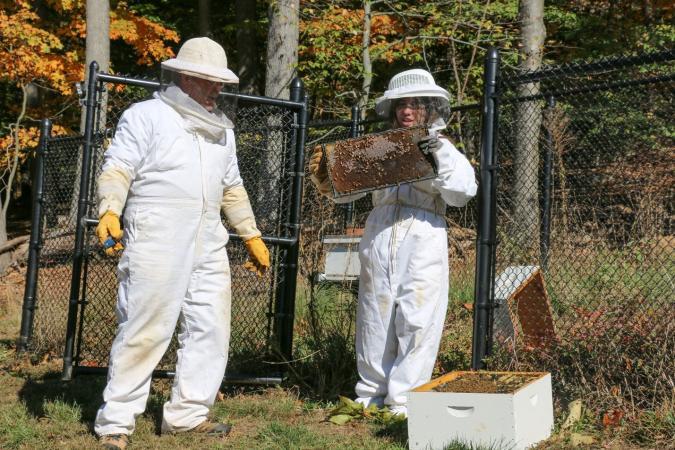
“Becoming a Bee Campus is important to Pace as it shows our commitment to creating a sustainable campus that will function both as healthy ecosystem for native plants and animals and as a living laboratory for students,” said Dyson College of Arts and Sciences Associate Professor Michael J. Rubbo, PhD. “We plan on creating pollinator gardens where pollinators (bees, butterflies, beetles) can find sources of food and where students can study pollinators and develop solutions for their conservation.”
Ryan McEnany, Pace University’s Director of Energy and Resiliency said: “The Bee Campus USA designation is significant because it brings attention to the fact that pollinator populations have been in decline. This extends further than the colony collapse disorder in honeybee populations and is also affecting local bees, butterflies and other organisms that help create fruits, flowers and other plant life. On a global level, 33 percent of the food we eat is made possible by insect pollinators, and 90 percent of wild plants and flowers need pollinators for survival.”
In the upcoming year, Pace will be working with students to create educational signage about pollinators and plans to have a number of pollinator-focused events. Pace joins over 90 Bee Campuses around the country.
The designation also comes at a time when a group of Pace University communication studies students are filming a documentary called Bee Aware, which focuses on the importance of bees and the role they play around the globe. Originally, the class was set to film in Paris, France, but after the pandemic hit – and all foreign travel halted – the students dispatched across the Northeast (New York, Connecticut, New Jersey and Pennsylvania) to interview local farmers and beekeepers. The students are working on the documentary through the summer and expect it will be completed in the fall.
About Pace University
Pace University has a proud history of preparing its diverse student body for a lifetime of professional success as a result of its unique program that combines rigorous academics and real-world experiences. Pace is ranked the #1 private, four-year college in the nation for upward economic mobility by Harvard University’s Opportunity Insights, evidence of the transformative education the University provides. From its beginnings as an accounting school in 1906, Pace has grown to three campuses, enrolling 13,000 students in bachelor’s, master’s, and doctoral programs in more than 150 majors and programs, across a range of disciplines: arts, sciences, business, health care, technology, law, education, and more. The university also has one of the most competitive performing arts programs in the country. Pace University has a signature, newly renovated campus in New York City, located in the heart of vibrant Lower Manhattan, next to Wall Street and City Hall, and two campuses in Westchester County, New York: a 200-acre picturesque Pleasantville Campus and a Law School in White Plains. Follow us on Twitter or on the Pace News website.
About Dyson College
Pace University’s liberal arts college, Dyson College offers more than 50 programs, spanning the arts and humanities, natural sciences, social sciences, and pre-professional programs (including pre-medicine, pre-veterinary, and pre-law), as well as many courses that fulfill core curriculum requirements. The College offers access to numerous opportunities for internships, cooperative education and other hands-on learning experiences that complement in-class learning in preparing graduates for career and graduate/professional education choices. Visit the Dyson website.
About Bee City USA
Bee City USA® urges municipalities, individuals, organizations, corporations, and communities to promote and establish pollinator–friendly landscapes that are free of pesticides. Since its inception in Asheville, North Carolina in 2012, five more cities and been certified and about fifty more are in the process of preparing applications. For more information about the application process for becoming a Bee City USA community, visit the Bee City USA website.
Pace University Names New Dean Of Lubin School Of Business
Dean Singleton Has A Proven Track Record of Program Innovation and Success
NEW YORK and PLEASANTVILLE, N.Y. (August 6, 2020) – Pace University appointed Lawrence G. Singleton as dean of the Lubin School of Business, President Marvin Krislov today announced.
In naming Singleton as dean of Pace University’s business school, which has an established global reputation for preparing students to be competitive, successful and ready on day one in their careers, Krislov cited the new dean’s leadership and success at the School of Business at The George Washington University and Marist College, along with his professional experience as a professor, certified public accountant, and consultant to major companies around the world.
"Dr. Singleton has a proven track record of program innovation and a deep dedication preparing students for successful careers," said President Marvin Krislov. "He'll provide exactly the leadership Lubin needs to adapt for a competitive future, while staying true to its roots as the best place in New York for a hands-on, skills-based business education. We're excited to have him join us at this critical time."
Dean Singleton most recently served as dean and professor of accounting and international business at Marist College in Poughkeepsie, NY. He was previously a member of the faculty of the School of Business at The George Washington University in Washington, D.C. where he held many leadership positions, including associate dean for undergraduate programs.
In addition to his academic credentials, Singleton has held many professional positions throughout his career. He worked in the audit and National SEC Practice groups of Ernst & Young LLP’s Washington office, and was a visiting professor at Grenoble Ecole de Management in France and Peking University in China. He has also served as a consultant to many of the world’s leading organizations, including Cisco Systems, Inc., Harley-Davidson Motor Company, NASDAQ Stock Market, National Geographic Society, and The World Bank.
Singleton is a member of the American Institute of Certified Public Accountants, Beta Gamma Sigma, Beta Alpha Psi, the American Accounting Association, the National Investor Relations Institute, and the Society for Human Resource Management.
He currently serves on the Board of Governors of Beta Gamma Sigma and as a member of the Board of Directors of The Hudson Renewable Energy Institute. Singleton received PhD, MS, and BS degrees in accounting from Louisiana State University. He is a certified public accountant and a chartered global management accountant.
“I couldn’t be more pleased to be joining Pace University where job-readiness, career placement, and world-class scholarship are part of the fabric of the institution,” Singleton said. “I look forward to working with students, faculty, staff, leadership and alumni to continue this tradition during what is a critical, competitive and exciting time for both business and education.”
Pace University was initially established as a business and accounting school in 1906, and while it has grown considerably since its inception, it remains true to its beginnings. The Lubin School of Business is renowned around the world and is routinely ranked by U.S. News & World Report. It is one reason why Pace is ranked the No. 1 private, four-year college in the nation for upward economic mobility by Harvard University’s Opportunity Insights.
Earlier this year, Lubin launched an accelerated and revamped MBA program that is faster, flexible, and more convenient for students, complete with a specialized curriculum, which includes in-person classes, an exclusively online MBA option, and a mix of both -- ideal for working professionals and people looking to advance their careers. To learn more about the program, specific course offerings, or any of its other specialties and degrees, visit the Lubin School of Business.
“A high-quality education that provides students with knowledge, skills and connections is a must in today’s competitive marketplace,” said Pace Provost Vanya Quiñones. “Dean Singleton understands what our students need to thrive at Pace and in their careers. We’re thrilled to have him join our community.”
About Pace University
Pace University has a proud history of preparing its diverse student body for a lifetime of professional success as a result of its unique program that combines rigorous academics and real-world experiences. Pace is ranked the #1 private, four-year college in the nation for upward economic mobility by Harvard University’s Opportunity Insights, evidence of the transformative education the University provides. From its beginnings as an accounting school in 1906, Pace has grown to three campuses, enrolling 13,000 students in bachelor’s, master’s, and doctoral programs in more than 150 majors and programs, across a range of disciplines: arts, sciences, business, health care, technology, law, education, and more. The university also has one of the most competitive performing arts programs in the country. Pace has a signature, newly renovated campus in New York City, located in the heart of vibrant Lower Manhattan, next to Wall Street and City Hall, and two campuses in Westchester County, New York: a 200-acre picturesque Pleasantville Campus and a Law School in White Plains.
About the Lubin School of Business at Pace University
Globally recognized and prestigiously accredited, the AACSB International-accredited Lubin School of Business integrates New York City’s business world into the experienced-based education of its students at Pace’s suburban and downtown campuses, implemented by one of the region’s largest co-op programs, team-based learning, and customized career guidance. Its programs are designed to launch success-oriented graduates toward upwardly mobile careers.
Q&A with Cristina Alesci ’01
Cristina Alesci '01 discusses her work as a journalist at CNN and her path there from Pace.
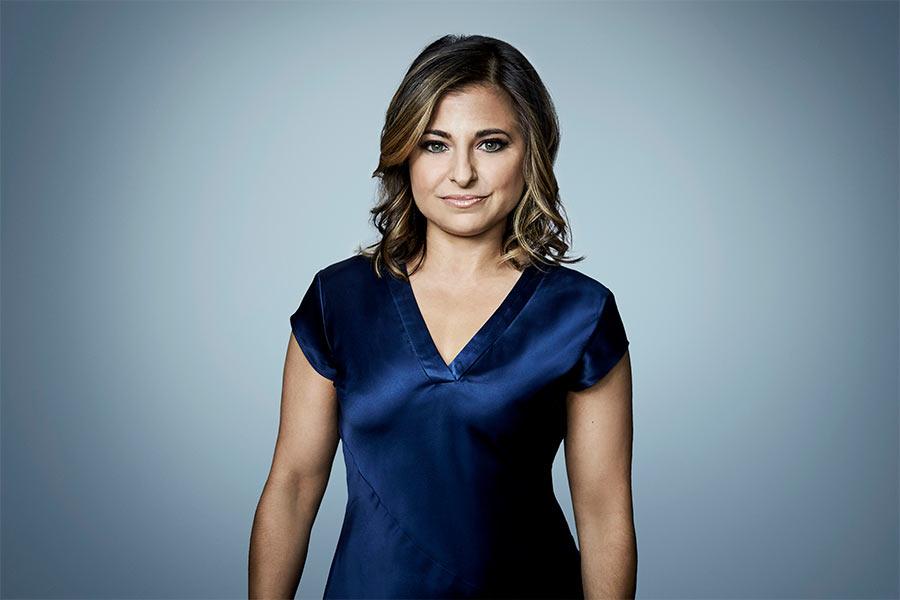
You are a business and politics correspondent for CNN, covering financial markets, economic policy, and political campaigns. How did you become interested in journalism and how did you get started?
I’ve always enjoyed writing and been very curious. I also have a hard time accepting an answer that doesn’t make sense. The result being I ask a lot of questions, which can irritate some people. I’m like that annoying dog who won’t stop barking until she gets a treat. My treat is information.
Journalism was my third job after college. I started writing as a hobby while working full-time, first as a paralegal and then as a sales rep for a major pharmaceutical company. It quickly became an obsession. I enrolled in night classes because I really wanted to get published. For two years, I pitched editors at every New York City publication you could name—and a few you’ve probably never heard of. My first big break was a freelance job editing nightlife listings for the New York Press, which sadly, no longer exists. However, it got my foot in the door and the editors started printing some of the stories I pitched.
The first time I saw my name in a byline was intoxicating—I felt a rush of pride, joy—and relief! It was still a long road from that point to CNN, but from that moment I was hooked.
What is your typical day like and how do you prepare for it?
There’s no such thing as a typical day. I often wake up at 6:00 a.m. with a plan for the day and by 6:15 a.m., it’s blown up. A few hours later I may be sent off to a Senate hearing in Washington, the floor of the New York Stock Exchange, or a farm in the middle of Iowa to cover trade policy.
The only thing you can do to prepare is to get comfortable with the unexpected. In practice, that means reading extensively, always carrying extra battery chargers, and keeping a bag packed at all times.
Journalism today faces many issues and controversies, and the media’s power is constantly being questioned. What do you feel is the role of a journalist and how have you exemplified that in your work?
The public should scrutinize the press and read and watch news critically. It helps us do our jobs better. However, I do take issue with the current vilification of the press. We are not the enemy of the people—we are its eyes, ears and voice. At their core, Americans know that democracy isn’t possible without a free press.
I also protect my sources fiercely—they’re the lifeblood of every story. I make sure to make time for the people who may give me my next lead.
Journalism is often described as the first draft of history. My job, above everything else, is to make sure I have all the facts correct. A lot of that involves triangulating what sources tell me. I also spend a great deal of time thinking about the motivations, merits and unintended consequences of fiscal and monetary policies.
What interviews are you most proud of and why?
A few years ago, I interviewed Ursula Burns, who was raised in a New York City housing project a mile north of Pace. She grew up to become the CEO of Xerox. Her story is amazing and I profiled her for a CNN documentary series I developed called American Dream. A lot of women—and men—have told me how Ursula’s story inspired them to strive and succeed.
What challenges have you faced along the way and how did you overcome them?
A big challenge for anyone in this business is protecting your sources and knowing whether you can trust what they’re telling you. There’s no substitute for time and experience on this one. Personally, I deal with it by exercising discipline. I would rather lose a story to a competitor than publish one I’m not 100% confident is right or that will reveal, or “burn,” my source.
What attracted you to Pace and the study of criminal justice as a major? How did that transition to an interest in a career in journalism? Did you see commonalities between the two?
Pace afforded me a great education in the middle of New York City—and I mean that literally. Pace offered me a partial scholarship, which enabled me to earn my degree without the burden of enormous student loans. Low debt was one reason I was able to take a risk on journalism several years later.
When I first arrived at Pace, my dream was to become an FBI agent. I felt an intense desire to hold powerful people accountable and protect those who were unable to defend themselves. Although I never made it to Quantico, I’m still pursuing my passion—only I use a press pass and a camera instead of a badge and a gun.
Attending college is a significant experience in a person’s life. As you look back at your time as a Dyson student, how did it mold you into the person you are today?
Dyson exposed me to a very diverse student body, both economically and culturally. Many of the students were recent immigrants or first-generation Americans like me, so even though our individual backgrounds were different, we had a commonality that united us. We all wanted to succeed—and the school helped. Through Dyson, I landed an internship with a Wall Street law firm, which was my first exposure to the international financial markets. That experience shaped the rest of my career. I ended up loving finance, which is one of the reasons I still cover it today.
Were any particular faculty members or mentors instrumental in your personal and/or professional journey?
Without a doubt. I would not be a journalist today were it not for my literature professor, Ruth Johnston. She had a passion for her subject that was exciting and had confidence in me. We formed a strong bond that lasted after graduation. I sought her advice over the years and when I was weighing whether to pursue a career as a reporter, she not only pushed me to do it, but practically shoved me through the door of the graduate school where I ultimately studied journalism. She was literally my angel.
Where are you from originally?
I was born in Staten Island, and raised in Brooklyn and Queens. In high school, my parents moved to Long Island, but I couldn’t wait to come back (another reason I went to Pace, by the way).
Dyson students have many options as far as majors that can lead to a career in journalism, including recently, one in digital journalism. As a woman in media, do you have any advice for our female students who wish to follow in your footsteps?
Get comfortable with rejection. Seriously. Editors will deny your pitches, sources will shut doors in your face, and just about everyone else gets annoyed with you. The most successful reporters actually enjoy that kind of rejection because it usually means they’re on to something. Don’t take it personally and keep pushing.
What are some of your biggest goals for the future?
Americans need to love economics and personal finance as much as they do sports and gossip. My goal is to make that happen.
As a board member of the Craig Newmark Graduate School of Journalism CUNY Foundation, I want to ensure that future generations of journalists will have the opportunity to learn the craft of journalism without paying a fortune for that training.
If you haven’t already seen this video, check out Cristina’s interview with some of New York City’s greatest success stories, including Howard Schultz, Alan Greenspan, Mickey Drexler, Russell Simmons, and Ursula Burns, as referenced above.
Pace University Names New Dean Of Dyson College Of Arts And Sciences, School Of Education
NEW YORK AND PLEASANTVILLE, NY (July 28, 2020) – After an extensive nationwide search that included candidates from across the country, Pace University today announced the appointment of Tresmaine R. Grimes, PhD, as dean of the Dyson School of Arts and Sciences and the School of Education.
“Dean Grimes is a student-focused leader with a strong commitment to research, scholarship, and supporting student success.” - President Krislov
In appointing Grimes in a dual role of serving as the new dean of its largest school and the School of Education, President Marvin Krislov cited the native New Yorker’s impressive background in higher education; her steadfast belief in the power of education to transform lives; and her commitment to diversity and inclusion throughout her career.
“Dean Grimes is a student-focused leader with strong commitments to research, scholarship, and student success,” said Pace President Marvin Krislov. “A first-generation college student passionate about supporting other first-gen students and a dedicated mentor to generations of students and colleagues, she has the vision to guide Dyson College and the School of Education into a strong future.”
Grimes was born in Brooklyn and raised in Manhattan. She was the first generation in her family to earn a college degree after a high school guidance counselor saw potential and encouraged her to apply to college. She excelled on campus and earned a Bachelor of Arts from Yale University with a double-major in Afro-American Studies and Psychology. She then pursued her studies at The New School for Social Research where she received a Master of Arts in Psychology, and later earned a Master of Philosophy and doctorate in Developmental Psychology from Teachers College, Columbia University.
Grimes’ rise in higher education is equally as impressive: Her career began at South Carolina State University as a member of the Psychology and Sociology Department. During her nine-year tenure at SC State, Grimes served as chair of the department for four years. In 2000, she joined the faculty of Iona College as an adjunct professor of psychology, and worked her way to become a tenured associate professor of psychology. Seven years later, Grimes was promoted to Assistant Vice President for Academic Affairs at Iona College, a position she held eight years. After Iona, she went to Bloomfield College where she served as Vice President for Academic Affairs/Dean of Faculty and a psychology professor for four years.
In joining the leadership at Pace University, Grimes said she’s excited to fulfill its mission of Opportunitas, and to guide students along a path to academic, professional, and personal success. She looks forward to mentoring students and faculty alike so that they can think, learn, grow, and adapt in a constantly changing global marketplace.
“Education provides us with an opportunity to move beyond our own boundaries and, at times, our self-imposed limitations,” Grimes said. “I’ve had so many opportunities in education and beyond because someone saw something in me. As an educator, I believe it’s my responsibility to open doors for others and encourage people to appreciate the process of learning. I’m so excited to be joining the Pace community.”
Grimes noted that she was impressed with Pace’s top ranking among four year universities in upward economic mobility among four-year private universities, according to a study conducted by Harvard University’s Opportunity Insights, a distinction that is an integral part of the university’s mission and academic DNA, she said.
“Dean Grimes understands all too well that higher education provides life-changing opportunities and is a driver of social mobility,” said Vanya Quiñones, provost, Pace University. “She knows this from experience and has seen it in the thousands of lives she has influenced as an educator. She’s the right fit for our students and faculty and we couldn’t be happier that she’s joined us.”
During her career, Grimes has been particularly dedicated to issues of mental health. In 2004, she was part of a delegation of American mental health professionals that traveled to South Africa to exchange ideas with mental health professionals in that nation. The primary focus of the trip was to study the impact of apartheid-related trauma, sexual assault, and HIV/AIDS on the mental health status of the South African population. Grimes has also served as a grant reviewer for the Department of Health and Human Services and for several faith-based funding initiatives.
Over the years, Grimes has received many awards and recognitions. She was the recipient of the South Carolina Psychological Association Teacher of the Year Award in 1998 and 1999 and was nominated for Teacher of the Year at South Carolina State University in 1996. She is especially pleased that several of her psychology students have gone on to earn doctorates in psychology and related fields. She considers this her contribution to the effort to increase the number of ethnic minority psychologists and mental health professionals in the United States.
In addition to her active professional life, Grimes is a pastor and the founder of a 501(c)(3) nonprofit organization established to provide education to prevent domestic violence in faith-based communities. She and her husband, Clarence, are the parents of two adult children and have two grandchildren. They live in New Rochelle, NY.
About Dyson College: Pace University’s liberal arts college, Dyson College offers more than 50 programs, spanning the arts and humanities, natural sciences, social sciences, and pre-professional programs (including pre-medicine, pre-veterinary, and pre-law), as well as many courses that fulfill core curriculum requirements. The College offers access to numerous opportunities for internships, cooperative education and other hands-on learning experiences that complement in-class learning in preparing graduates for career and graduate/professional education choices.
About Pace University
Pace University has a proud history of preparing its diverse student body for a lifetime of professional success as a result of its unique program that combines rigorous academics and real-world experiences. Pace is ranked the #1 private, four-year college in the nation for upward economic mobility by Harvard University’s Opportunity Insights, evidence of the transformative education the University provides.
From its beginnings as an accounting school in 1906, Pace has grown to three campuses, enrolling 13,000 students in bachelor’s, master’s, and doctoral programs in more than 150 majors and programs, across a range of disciplines: arts, sciences, business, health care, technology, law, education, and more. The university also has one of the most competitive performing arts programs in the country. Pace has a signature, newly renovated campus in New York City, located in the heart of vibrant Lower Manhattan, next to Wall Street and City Hall, and two campuses in Westchester County, New York: a 200-acre picturesque Pleasantville Campus and a Law School in White Plains.